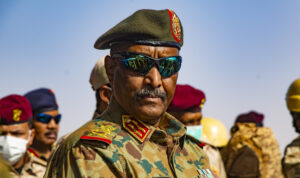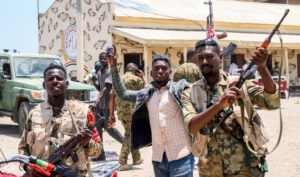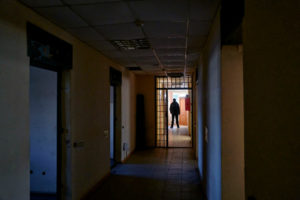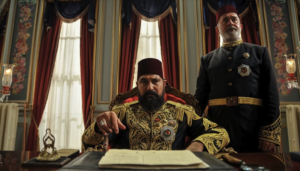“A phased shift is happening in the world. And it’s a good thing.” That is Yevgeny Prigozhin’s bullish assessment on Telegram of the Wagner Group’s growing impact on the Global South. Under his leadership, the quasi-private mercenary force has quickly cemented itself as the most trusted security partner for governments in central Africa, supplanting France and creating enormous anxiety in the West.
In the process, Prigozhin has become the state-sanctioned tip of Russia’s foreign policy spear — a position that is unlikely to change anytime soon, despite recent reports suggesting that there is a growing rift between him and Vladimir Putin. The footprint of the Wagner Group has become indispensable, both for Russia’s war aims in Ukraine and for its longer-term stability. And Prigozhin is something of an enigma: he both represents the will and the policies of the Kremlin, while also being one of the few — and certainly the most prominent — voices inside Russia that can effectively challenge Putin’s state. While Kremlinology is a difficult art, it appears very possible that Prigozhin serves as controlled opposition for Putin: a hawk who can appeal both to domestic ultra-nationalists upset with the course of the war in Ukraine and to security-obsessed regimes abroad. In that sense, we should see Prigozhin more as a shadow defence minister than an entirely independent actor.
When asked about growing calls from within the House of Commons to declare his force a terrorist organisation — which the British government now plans to do within weeks — Prigozhin wrote on his Telegram channel: “The Wagner PMC has been fighting ISIL, Al-Qaeda, Boko Haram, and other terrorist organisations everywhere, and very successfully.” If Wagner is a terror group, Prigozhin sarcastically wrote in Russian, then perhaps al-Qaeda and the Islamic State should become humanitarian charities, they could even hold meetings inside Westminster. “I’m all for such an arrangement,” he wrote.
It’s remarkable smugness from the head of a fighting force responsible not just for brutal torture, executions, even possible war crimes — but for filming and broadcasting the atrocities to serve as propaganda. He presides over a group, staffed with special forces veterans and conscripted prisoners, that has helped Syrian dictator Bashar al-Assad regain his grip on power in Syria and delivered some of Russia’s only recent territorial gains in Ukraine. And now, thanks to him, Russia is being venerated as an anti-colonialist, anti-terrorist power by governments and citizens in Burkina Faso, Mali, the Central African Republic, and further afield. As Jonathan Batenguene, a Cameroonian political analyst, explained to me, there is a rising perception in Africa that Russia is a “reliable partner in the struggle against terrorism”.
Prigozhin’s play in the Sahel should be a wakeup call to the United States and France in particular. Their decades of counter-terrorism operations in the region have not brought security: self-interested efforts have, in some cases, only fomented more militancy and violence.
If the West hopes to both stabilise central Africa and deny Russia new trading partners, it will need to get serious about solving the region’s substantial security challenges — and acknowledge its own role in creating them. One problem has been that the West has spent far too much time pursuing its own counter-terrorism objectives — that is, denying groups such as the Islamic State and al-Qaeda a base from which to launch attacks on Europe and North America — and far too little considering how best to foster long-term stability. Even when state-building has been part of a counter-terrorist strategy, it has often not gone to plan: the United States’ long-running investment in Iraq or France’s long-suffering relationship with the Malian government are prime examples.
But those investments have grown deeply unpopular. Resolve to provide security to nations in the Global South has fallen, particularly as the threat of terrorism in the West has declined significantly. In some cases, the consequences of these open-ended interventions, which inevitably lead to civilian casualties, have worsened the situation in a fundamental way.
The ousting of Libyan leader Colonel Muammar Gaddafi in 2011, for example, unravelled Tripoli’s security state and unleashed a flood of weapons and fighters into the region. That domino toppled a series of others, and understanding how that Western action led to calamity in Mali and Burkina Faso can help explain why these countries have welcomed Wagner with open arms.
In Northern Mali, Gaddafi’s fall prompted Tuareg militias, which once counted Gaddafi as a benefactor, to push for long-sought independence; they even briefly declared the creation of the Azawad republic in 2012. During the period of instability, Islamist groups rushed in and seized territory. Some have organised under the Jama’at Nasr al-Islam wal Muslimin umbrella group, affiliated with al-Qaeda; while others have joined The Islamic State in the Greater Sahara. Mali has been locked in a brutal war ever since.
Militancy was on the march, but Western appetite for another Libya-style intervention was low, so the West, America in particular, wildly expanded its drone programme instead. France’s approach has been more hands on, but not by much. Operation Serval was launched in 2013 to eliminate the threat posed by these trans-national jihadist groups. The multi-national coalition was designed to help Mali’s government in Bamako regain control of the region, but as the European Council on Foreign Relations says it “dislodged the jihadist groups from Mali’s cities, but did not eliminate them”. After the operation ended in 2014, “they slipped away and reorganised”.
The fighting soon spilled over into Burkina Faso. Following two military coups in 2022, France launched a second mission, Operation Barkhane. But it proved even less successful than Operation Serval. In a taxonomical look at how the effort floundered, analyst Nathaniel Powell writes that “broadly speaking, the answer boils down to a combination of unalterable structural features of France’s intervention, a misunderstanding of local conflict dynamics, serious political mistakes, and operational errors”. The situation worsened so severely that even Canada abandoned the parallel United Nations peacekeeping mission, to cheers from Islamist factions.
It is in this context that the Wagner Group arrived in the region. One of its first orders of business when it landed in Mali in 2021 was to go after France as a neo-colonial power which had no concern for civilian lives. According to Paris, the Russian mercenaries went so far as to stage bodies near a Malian military base in order to accuse France of a massacre. (The murders were, in fact, likely conducted by Wagner themselves.)
The citizens and decision-makers in West and Central Africa don’t need to be helped to the conclusion that Western aid and intervention has utterly failed to address the mounting security concerns in the region. But Russia is still keen to make the point.
Wagner’s propaganda campaign in Africa is a serious and well-financed affair, as revealed in those leaked American intelligence memos. “The campaign’s primary objective was to promote Russian foreign policy in a manner that would shape public opinion towards African nations pulling back from Western pressure and realigning with Russia in mutually beneficial cooperation,” the leaked intelligence reads. That includes propaganda which “highlight US and French interference in African internal affairs and conducting activities to shape a negative attitude toward the armed forces of Western countries against a backdrop of crimes committed by their military members, particularly in Burkina Faso and Mali”.
As a result, Wagner’s footprint in the region has grown quickly. It is believed that Prigozhin’s forces are now present, at least to some degree, in the Central African Republic, Libya, Sudan, South Sudan, Chad, Mozambique, the Democratic Republic of Congo, Burundi, Guinea-Bissau, Nigeria, Madagascar, Botswana, Comoros, Rwanda, and Lesotho. That presence ranges from fairly minimal, as in their single office in Lesotho, to quite substantial — US Signals Intelligence reports that 1,645 Wagner fighters were present in Mali earlier this year.
There is little doubt about Wagner’s impure intentions: there is ample evidence that Prigozhin hopes to pilfer diamonds and other natural resources while using these countries to launder weapons and goods for Russians. Yet the perception is that France and the United States are equally greedy and self-interested, if not more so — and there are certainly data points to back up that belief.
“One of the reasons that these guys are popular is because they actually die,” says John Lechner, a freelance journalist who spends considerable time in the Central African Republic. That is: Wagner fighters are on the ground, battling militants. They appear to be risking their own lives to bring security to these states. One official from an unnamed Sahel country, speaking to the US Institute of Peace, remarked: “When your house is burning you don’t judge the quality of the water you spray to stop the flames.”
Wagner’s support also means weapons. Whereas the West has been apprehensive about selling weapons to some of these regimes, Russia has had no such qualms. Look no further than Sudan, where evidence has emerged of Wagner arming the rebellious Rapid Support Forces with missiles as they fight a deadly conflict against the ruling military regime.
Russian-backed weapons deals serve as a quid pro quo — a way for African countries to source military hardware without jumping through America’s and Europe’s hoops, while also helping Russia to prosecute its war in Ukraine. The leaked US intelligence documents state that: “According to Prigozhin affiliates, Malian Transition President Assimi Goita was involved in efforts to acquire weapons from Turkey for Vagner’s interests.”
The question of how to frustrate Russia’s Scramble for Africa is painfully simple. The West needs to work with the United Nations, African Union, and local governments to become a reliable partner in the region, not just to strike militant groups, but to bring about long-term stability and security. It also needs to look back on its past decade of involvement in the region and ask why it has failed. But a strategy that targets Wagner first and foremost is not strategy at all. Forcing the Wagner Group out of the Central African Republic in short order, Lechner argued, “could be very negative from a civilian protection standpoint”. “You better be coming with something better to replace it.”
If the West is to supplant Russia in Africa, it must prioritise ending the human suffering caused by these interlocking crises. But it must also put a stop to Russia’s attempt to forge an international illiberal alliance. Like a new Warsaw Pact, Moscow hopes it can — using Prigozhin as its conduit — win over long-term partners to trade with and launder resources through. This will be Putin’s only hope at remaining in power as sanctions continue. Even if Prigozhin loses his favour with Moscow or, even more unlikely, if he winds up outmanoeuvring Putin and replacing the strongman as leader, these tactics are likely to continue, or even intensify.
Russia has no shortage of possible partners, especially in countries where the state has proved itself incapable of maintaining order, and where the international community has talked a good game but not delivered: Haiti is a prime example. The leaked US intelligence reports that Prigozhin has plans to approach the Haitian government with an offer to help their fight against gangs that have taken over swathes of the country. This comes as traditional Haitian partners — France, the United States, Canada — have proved unable to help Port-au-Prince restore order.
Continued violence in Yemen, Sudan, and Libya presents another opportunity for Russia to pick winners and install client states. And there are signs that Wagner is planning to foment unrest elsewhere, like Côte D’Ivoire, so it can swoop in and offer security solutions. This is just colonialism, cloaked in bilateral aid. China has perfected this strategy with its Belt-and-Road Initiative. Whereas Beijing is keen to hook developing countries up to debt bondage, Russia wants to help them outsource their domestic security to a paramilitary force with no concern for human rights.
Disclaimer
Some of the posts we share are controversial and we do not necessarily agree with them in the whole extend. Sometimes we agree with the content or part of it but we do not agree with the narration or language. Nevertheless we find them somehow interesting, valuable and/or informative or we share them, because we strongly believe in freedom of speech, free press and journalism. We strongly encourage you to have a critical approach to all the content, do your own research and analysis to build your own opinion.
We would be glad to have your feedback.
Source: UnHerd Read the original article here: https://unherd.com/







